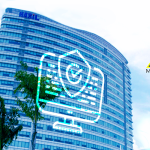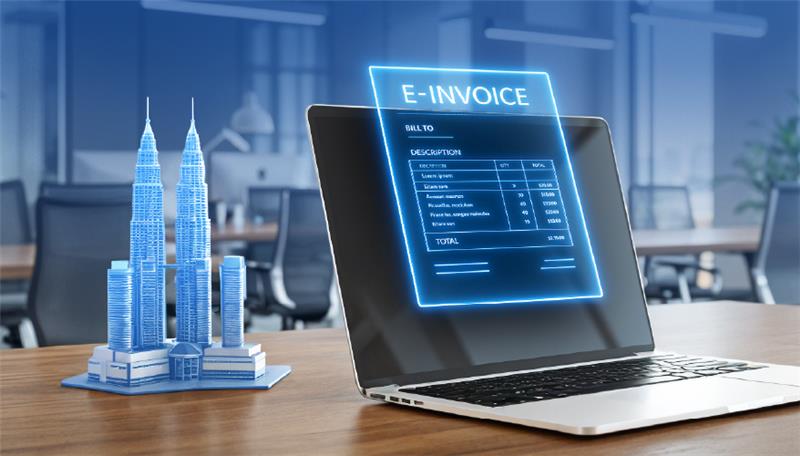
E-Invoicing in Malaysia: Important Terms You Must Know
August 26, 2024
How IRBM is Ensuring Data Security and Privacy Monitoring in Malaysia
September 10, 2024E-Invoicing in Malaysia: Everything you need to know

e-Invoicing is transforming the Malaysian business landscape. The Inland Revenue Board of Malaysia (IRBM) has mandated the adoption of electronic invoicing to streamline tax administration, enhance compliance, and boost efficiency. In this article, we will discuss everything you need to know about e-Invoicing in Malaysia.
Let’s understand the intricacies of e-Invoicing in Malaysia, providing essential information for businesses of all sizes. We will explore the key players, the types of transactions covered, the implementation timeline, and the specific requirements for e-Invoices. By understanding these elements, businesses can navigate the transition to e-Invoicing seamlessly and reap the benefits of this digital transformation.
e-Invoicing Authority in Malaysia
The Inland Revenue Board of Malaysia (IRBM), also known as Lembaga Hasil Dalam Negeri Malaysia (LHDNM), is the governing body responsible for implementing and overseeing e-Invoicing in the country. They have established a dedicated e-Invoice framework to ensure a smooth transition for businesses.
To facilitate seamless e-Invoicing across borders and different systems, the Malaysian Digital Economy Corporation (MDEC) will serve as the PEPPOL Authority for Malaysia, overseeing the promotion and implementation of PEPPOL in the country. Malaysian businesses can choose to use the PEPPOL network by partnering with an MDEC accredited PEPPOL Service Provider (SP) or subscribing to a solution from any PEPPOL Ready Service Provider (PRSP).
PEPPOL, an international e-Invoicing standard, enables businesses to exchange invoices and other business documents securely and efficiently. By leveraging PEPPOL, Malaysian businesses can integrate with a global network of trading partners, simplifying cross-border transactions and reducing administrative burdens.
e-Invoicing in Malaysia: Who is it For?
e-Invoicing applies to all taxpayers undertaking commercial activities in Malaysia. Read all about the wide range of entities covered under e-Invoicing in Malaysia, including:
- Businesses: Sole proprietorships, partnerships, limited liability companies, and corporations of all sizes.
- Non-profit organizations: Associations, bodies of persons, cooperatives, and trusts engaged in commercial activities.
- Government agencies: When involved in business transactions with private entities.
Types of Transactions Covered Under Malaysia e-Invoice
e-Invoicing in Malaysia applies to all commercial activities in the country, including the sale of goods and services. The official mandate by the Inland Revenue Board of Malaysia covers the following types of transactions:
- B2B (Business to Business): e-Invoicing enables seamless B2B transactions, facilitating faster payments, effortless invoicing, and improved operational efficiency. Businesses can leverage specialized B2B invoicing software to automate tasks and optimize cash flow.
- B2C (Business to Customers): While not mandatory for every sale, e-Invoicing simplifies revenue management for businesses dealing with individual customers. Businesses can still issue traditional invoices or receipts and consolidate these into a single e-Invoice for submission to LHDN (Lembaga Hasil Dalam Negeri) before the 7th of next month.
- B2G (Business to Government): Similar to B2B transactions, e-Invoicing streamlines the flow of invoices between businesses and government entities, enhancing transparency and efficiency.
Note: e-Invoicing in Malaysia applies to all taxpayers/individuals/legal entities conducting a commercial activity, including but not limited to:
- Associations
- Bodies of Persons
- Branches
- Business Trusts
- Co-operative Societies
- Corporations
- Limited Liability Partnerships
- Partnerships
- Property Trust Funds
- Real Estate Investment Trusts
- Representative Offices and Regional Offices
- Trust Bodies
- Unit Trusts
e-Invoicing in Malaysia Implementation Timeline
The IRBM has implemented a phased approach for e-Invoicing adoption. It is important for businesses to effectively implement e-Invoicing in Malaysia.
Following is the timeline:
|
Phase |
Target Businesses |
Implementation Date (Including Relaxation) |
|
Phase 1 |
Businesses with annual turnover exceeding RM100 million |
August 1, 2024 to January 31, 2025 |
|
Phase 2 |
Businesses with annual turnover between RM25 million and RM100 million |
January 1, 2025 to June 30, 2025 |
|
Phase 3 |
All Malaysian taxpayers |
July 1, 2025 to December 31, 2025 |
Exemption provided for taxpayer with annual turnover or revenue below RM 150,000.
Malaysian e-Invoice Specifications
In Malaysia, an e-Invoice that is deemed acceptable must have 55 mandatory areas, such as seller and buyer details, item description, quantity, price, tax, total amount, payment details, and so forth.
Categories used to classify these fields:
- Supplier Details
- Buyer Details
- Document Details
- Invoice Details
- Delivery Details
- Item Details
- Payment Details
Additionally, sales invoices will be verified by the Malaysian government using the government’s API using the Continuous Transaction Control (CTC) methodology. Malaysian e-Invoicing will be powered by the Tax Identification Number (TIN).
The supplier will receive a UID number and validation link through email after it has been verified and authorized by the Inland Revenue Board of Malaysia (IRBM).
Read about the list of fields required as per new guidelines for e-Invoicing in Malaysia here
Scenarios For Which e-Invoice Must Be Issued:
Following are the scenarios that are made mandatory:
- Proof of Income: Businesses must issue e-Invoices whenever they supply goods or services to a recipient. This enables the government to accurately track sales and revenue. The requirement may extend to documenting “other transactions” involving income/earnings.
- Proof of Expenses: e-Invoices are also crucial for documenting purchases and expenses related to your business. The final amount for expenses also includes any returns or discounts. When a customer buys from your business, an e-Invoice serves as proof of their expenditure for tax purposes. In cases involving a foreign seller and a Malaysian recipient, the recipient must issue a self-billed invoice to document the expense.
Types of e-Invoices in Malaysia
Malaysia’s e-Invoicing system mandates the issuance of several document types to accurately reflect business transactions:
- Invoices: The cornerstone of e-Invoicing, invoices document the sale of goods or services between businesses. They include essential details such as product or service descriptions, quantities, prices, taxes, and payment terms. Self-billed invoices are also used to record expenses incurred by businesses under the Malaysia e-Invoicing mandate.
- Credit Notes: These documents are issued to correct errors on previously issued invoices, such as overcharging or incorrect item descriptions. They can also be used to account for returned goods or services, providing a mechanism to adjust the original invoice amount without issuing a refund. Credit notes are crucial for maintaining accurate financial records and ensuring correct tax calculations.
- Debit Notes: Used to increase the amount due on a previous invoice, debit notes are typically issued for additional charges or costs incurred after the original invoice was created. Examples include late payment fees, shipping charges, or additional services rendered. They help ensure that businesses receive full payment for all goods and services provided.
- Refund Notes: Also known as refund e-Invoices, these documents confirm the return of a buyer’s payment. They are essential for completing the transaction cycle and providing clear documentation of refunds. Refund notes help maintain accurate financial records and facilitate reconciliation processes.
Each e-Invoice must have a unique identifier (UUID) and undergo rigorous validation to ensure compliance with IRBM regulations.
How to Generate an e-Invoice in Malaysia
Businesses have several options for generating and submitting e-Invoices to the IRBM:
- MyInvois Portal: A government-provided platform designed specifically for e-Invoicing, MyInvois offers a minimalistic and user-friendly interface for businesses to create, submit, and manage their e-Invoices. It is suitable for businesses of all sizes.
- Application Programming Interface (API): For businesses with advanced IT systems, an API allows for seamless integration with their existing software, automating the e-Invoicing process and improving efficiency. This option is ideal for larger businesses with sophisticated IT infrastructures.
- PEPPOL Service Providers/PEPPOL-Ready Solution Providers: Third-party service providers offer e-Invoicing solutions that comply with the local regulations from IRBM and PEPPOL standard for international e-Invoice sharing. These providers can help businesses with e-Invoice creation, submission, and validation, as well as providing additional features such as invoice management and reporting.
e-Invoicing Process Flow in Malaysia
The e-Invoicing process in Malaysia follows a structured workflow:
- Invoice Creation: Businesses generate e-Invoices using their preferred method (MyInvois, API, or PEPPOL service provider/PEPPOL-ready solution providers) and include all required information.
- Invoice Validation: The IRBM validates the e-Invoice to ensure it complies with the specified format and content requirements. This process helps maintain data integrity and accuracy.
- Unique Identifier Assignment: Upon successful validation, the IRBM assigns a unique identifier to the e-Invoice for tracking and reference purposes.
- Notification: Both the supplier and buyer receive notifications about the e-Invoice’s validation status. This ensures transparency and timely communication.
- Invoice Sharing: The supplier shares the validated eInvoice with the buyer, typically through electronic means. The e-Invoice may include a QR code for easy verification.
- Invoice Rejection or Cancellation: Buyers have a limited time (72 Hours) to reject an e-Invoice if it contains errors or discrepancies. Suppliers can then cancel the invoice within the specified timeframe. If not cancelled, the invoice becomes final.
Penalty for Not Generating e-Invoices in Malaysia
The Malaysian government had implemented strict penalties for non-compliance with e-Invoicing regulations under which businesses that fail to generate e-Invoices as required, would have faced severe consequences:
- Financial Penalties: Businesses may be subject to fines ranging from RM200 to RM20,000 for non-compliance.
- Imprisonment: In serious cases, individuals responsible for non-compliance may face imprisonment of up to six months.
- These penalties underscore the government’s commitment to enforcing e-Invoicing compliance and ensuring the smooth operation of the tax system.
- Considering the above, please also note that the IRBM has provided 6-month relaxations to all businesses across the implementation phases (I, II, and III) to generate consolidated e-Invoices for their transactions. The details are outlined under Section 16 of the “e-Invoice Specific Guideline (Version 3.0)”.
How IRIS MyeInvois can help you with e-Invoicing?
IRIS MyeInvois is a one-stop e-Invoice management solution for business e-Invoicing needs that will help with streamlining the processes without the hassle of massive changes to the current system setup.
The IRIS MyeInvois solution is designed to seamlessly integrate with any ERP/billing system using APIs or SFTP to minimize disruptions, prepare e-Invoices, share e-Invoices, manage notifications, and maintain compliance with government mandates.
Users can also choose to go for bulk-uploads (.csv or .json) on the portal and use the inbuilt transformation tool to convert input data to LHDN format (.xml or .json), validate the data before submission, or calculate missing values. Additionally, users do not have to worry about the throttling or submission related limitations set by LHDN on the MyInvois portal. The users can further choose to raise Manual e-Invoices on the portal, if needed.
The users can also add multiple entities under the same umbrella and work according to the organization hierarchy with multiple levels of user management and secure access management for all users registered under the business entities and branches (PoBs) based on their roles.
IRIS MyeInvois is also PEPPOL-ready and hence, it provides you a future-proof way for businesses to benefit from the digitization of invoicing and share invoices internationally using the PEPPOL standard.
Businesses can also instantaneously share documents to all customers/vendors through the e-mail feature on IRIS MyeInvois portal, regardless of their availability on the PEPPOL network, or consideration under e-Invoicing mandates.
Additionally, users can invite guests with view access to the platform, manage seller side/recipient side activities with the same account, and much more.



